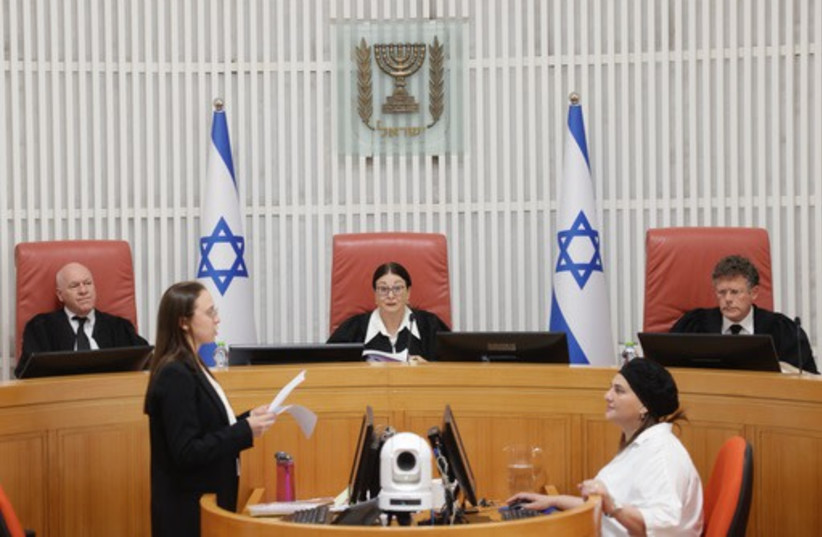Attorney-General Gali Baharav-Miara called for the High Court of Justice to strike down the reasonableness standard law in a Sunday morning opinion, the second time that her office has sanctioned the cancellation of a basic law amendment.
The government responded to the legal opinion by calling on the High Court to postpone the hearing next Tuesday. The attorney representing Prime Minister Benjamin Netanyahu, Justice Minister Yariv Levin, and the government previously asked for a delay so that he could properly prepare for the case, but on August 22 the court rejected the request due to scheduling constraints.
The attorney-general's legal opinion, which came ahead of the hearing next Tuesday, acknowledged the sensitivity of engaging in judicial review of basic laws, but explained that the amendment closed the door on recourse for people and groups harmed by unreasonable government decisions. The law removed the means for the public to defend themselves against arbitrary use of authority against them.
The law's limiting of this power created a "constitutional black hole" in accountability between the different powers, said the opinion. The court's ability to review government administrative decisions served as a longstanding check and balance, which are required to maintain a democratic legal system, said the opinion. Moreover, reasonableness law was part of a broader legal agenda that would allegedly undermine Israel's democratic regime, the judicial reform. The court needed to view the law under this broader scope when deciding to strike it down.
A further void in the law was created by the law, the Attorney-General's Office said, in relation to the requirement for officials to act reasonably -- to explain and justify their policies and work as insurance against corruption and nepotism. The requirement guides the hand of individual officials for thousands of decisions, which removes the necessity of court action. Without the reasonableness guidelines, policy may be informed more by political and personal extraneous considerations rather than public interest.
According to the opinion, the requirement for reasonable action was of notable importance to appointments to positions of power, preventing the arbitrary firing and replacing of professional civil servants with political agents. This could degrade the effectiveness of the civil service. Elections could also be impacted; the reasonableness standard was used to restrain and impose obligations for equal and fair elections.

The Attorney-General's Office argued that even if the court developed new legal tools to replace reasonableness and allow for administrative judicial review, there would be many cases that would in the meantime not reach the court. These tools could also be rendered inert by future legislation. While the doctrine of proportionality may be used to address human rights issues before the court, the tool has its limits and may not fill the gap covered by reasonableness in which the issue is not one of basic rights.
The legislation was advanced despite the warnings and reservations of experts from across multiple disciplines, said the opinion. Alternative proposals and changes were ignored and the final iteration of the bill threw "the baby out with the bath water."
The impact to the public, as well as the consequences of the law on the separation of powers, the rule of law, and human rights created an exceptional situation in which the very foundations of the democratic system were harmed, said the Attorney-General's Office. This warranted the striking of the law.
The High Court has never struck down a basic law amendment, and it is hotly contested if it has the power to do so. The Attorney-General's Office argued on Sunday that the court did in fact have the power to strike down basic laws, as the court itself plays a constitutional role in ensuring unconstitutional amendments were not passed. The power of the Knesset as a constituent authority was not absolute, the opinion contented, and could abuse this power. This is because the Knesset is both constituent authority and parliament, and political considerations could come to supersede constitutional norms in the formulation of legislation -- something that needed to be countered by the High Court. It was also argued that there was no basic law explicitly outlining the limits of and relationships between the branches on legislation, and jurisprudence did allow review of basic laws.
Since the law was passed with the aim of weakening the government's check in the form of the court, there was an institutional conflict of interest, making not a general law but a personal law against structural norms.
The attorney-general has previously sanctioned judicial review on a basic law amendment ahead of the incapacitation law hearing, which appears to be set to instead have delay application, pending a September 28 hearing.
What is the reasonableness doctrine?
The reasonableness standard is a common law doctrine that allowed the High Court to engage in judicial review of government administrative actions deemed far beyond what a reasonable and responsible authority would undertake. As part of the judicial reform, as law was passed on July 24 that restricted the law's application to civil servants and not to decisions by ministers, the prime minister, and government.
